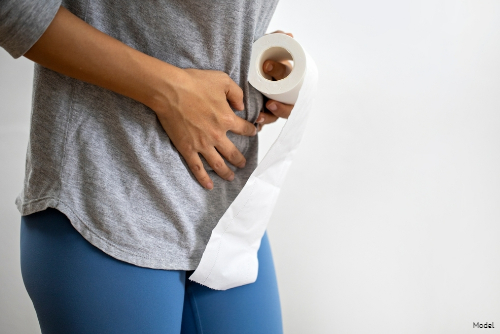
Here are some telltale signs you should seek help for your bladder problems:
- Urinary urgency/frequency
Do you find yourself sprinting to make it to the bathroom in time? Have you ever peed yourself from coughing or laughing due to a loss of bladder control? You may be suffering from an overactive bladder, also known as urinary incontinence. The four most common types of urinary incontinence are stress urinary incontinence, when your urethra does not compress tightly enough; urge urinary incontinence, when your bladder muscle contracts when it’s not supposed to; mixed urinary incontinence; when you have a mix of both stress and urge incontinence; and overflow incontinence, when you have the inability to urinate. With treatment for urinary incontinence, you can help reduce bladder leakage, strengthen pelvic floor muscles, reduce urgency and improve your quality of life. There are both non-surgical and surgical treatment options available, including:
● FemiLift™
● The O-Shot®
● The Viveve® Treatment
● Sacral Nerve Stimulation
2. Inability to empty bladder
Do you often feel like your bladder hasn’t completely emptied? Do you often have a slow, weak or interrupted urinary stream? Do you suffer from recurrent urinary tract infections (UTIs)? You may have urinary retention, the inability to empty the bladder completely. The two main types of urinary retention are acute urinary retention, a sudden inability to empty the bladder, and chronic urinary retention, an inability to empty the bladder completely that develops over time. One main cause of urinary retention in women is a hypotonic bladder muscle, when the muscle does not contract hard enough during urination to empty the bladder completely. Other causes are dysfunctional voiding, when the muscles around the urethra do not relax enough during urination to allow urine to pass freely, and vaginal prolapse, when the urethra is compressed and blocks the passage of urine. Common non-surgical and surgical treatments for urinary retention include:
● Pelvic Floor Therapy
● Vaginal Pessary
● Clean Intermittent Self-Catheterization
● Sacral Nerve Stimulation
● Urethrolysis
3. Pelvic pain
Do you feel pressure in your pelvis and/or lower back? Do you experience painful sex? Are urinary issues intruding on your quality of life? You may suffer from pelvic prolapse, when your pelvic floor weakens, and your pelvic organs drop down and bulge out of the vagina. Many women don’t realize they have pelvic prolapse, because although it is uncomfortable and progressive, it isn’t a painful condition. Pelvic organ prolapse affects the bladder, uterus, vagina and rectum, and is typically caused by damage from childbirth trauma or aging. Fortunately, fellowship-trained urogynecologist Dr. Aguirre has decades of expertise and the highest level of training correcting pelvic prolapse. Depending on the location and severity of your condition, you may benefit from the following treatment options:
● Kegels
● Biofeedback
● Surgery
Finding relief for your bladder issues is just a phone call away! Take the first step today and call us at 303-322-0500 or request a consultation online.




